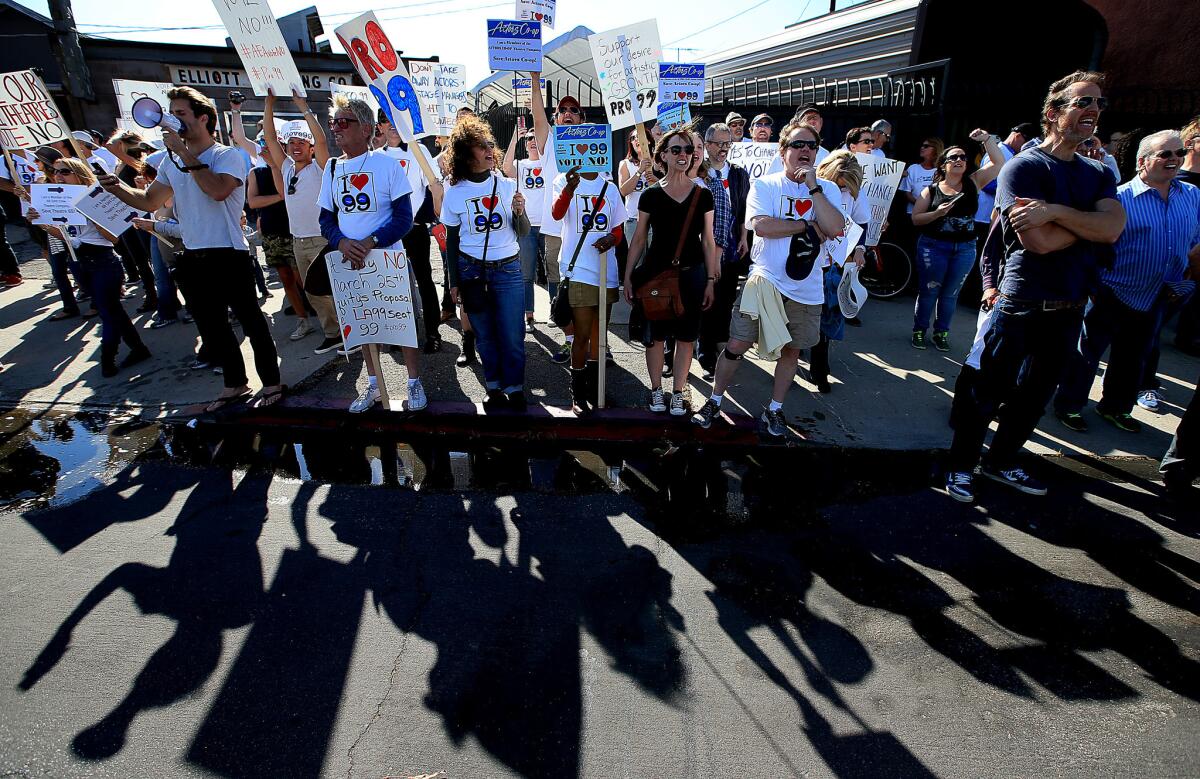Early reaction to new minimum wage for stage actors: ‘Sad day’ for L.A.

Los Angeles members of Actors’ Equity marched last month against a proposal to institute a minimum hourly wage for stage actors.
Leaders of small theaters across Los Angeles County began reacting to their new reality Wednesday morning: drastically increased costs from a new $9 hourly minimum wage imposed by leaders of Actors’ Equity, the national stage actors’ union.
“It’s a sad day for Los Angeles,” said Gary Grossman, producing artistic director of Skylight Theatre Company in Los Feliz. Like scores of other companies, Skylight has long depended on union actors who’ve been willing to rehearse for nothing and perform for stipends of just $7 to $15 per show — $240 or less for a typical 16-performance run.
The so-called 99-Seat Theater Plan had been unique to L.A. National union leaders decided Tuesday to end the anomaly and secure better wages for members.
Modest as it seems, applying the $9 hourly minimum to rehearsals, which can run up to 36 hours per week, could boost each actor’s earnings to more than $1,000 for shows requiring intensive preparation.
But by a 2-1 margin, more than 3,000 L.A. union members who cast ballots in a recent advisory vote were willing to do without the pay hike, instead urging leaders of the New York-based Actors’ Equity not to implement the minimum wage plan. Many wanted to retain their right to volunteer their time, forgoing a decent payday for the opportunity to satisfy creative yearnings in intimate venues — and get the exposure and good reviews that could lead to parts in major theaters, film or television.
The plan announced Tuesday by Actors’ Equity includes some changes from an earlier plan released in February. Those adjustments will keep costs down for “membership companies” staffed and run by union actors and for producers willing to stage shows in theaters with 50 seats or less. The producers would have to accept limits of no more than three productions per season, no more than 16 performances of each show and a budget of no more than $20,000 per show. They would pay only “reimbursement of [actors’] expenses,” according to the union’s announcement.
Producers such as Grossman, whose theaters aren’t built around a core acting company, will have to shoulder the higher payroll costs unless they submit to what the union calls the Los Angeles 50-Seat Showcase Code. The $9 minimum, which matches the current minimum hourly wage in Los Angeles County, will rise to keep pace with any countywide increases.
“We’re really disappointed in Equity’s response today, especially after the landslide vote in the referendum,” Grossman said Tuesday, citing L.A. members’ advisory vote against the hourly wage. He said he had received only sketchy details, but “right now it’s a complete disappointment.”
Grossman was partly responsible for the creation of the 99-Seat Theater Plan in the late 1980s, when he was among several Actors’ Equity members who filed a federal lawsuit to stop proposed rule changes for small theaters that union leaders were trying to implement. Since then he has been a member of a special review committee set up under the terms of a 1989 settlement of the lawsuit. The committee monitored how the plan was working, had regular discussions with L.A.-based union officials and from time to time negotiated adjustments with the union, including bigger stipends.
Grossman said he didn’t want to respond immediately to questions such as whether the membership companies, with their favored position, will now come to dominate the small-theater scene. “We’re working on very limited details right now.”
The plan that’s being implemented jettisoned an unpopular provision from the February version that would have forced membership companies to pay the $9 hourly minimum to new recruits. That was widely criticized as a formula for cutting off new blood and sentencing the member companies — among them the Actors’ Gang in Culver City and the Antaeus Company in North Hollywood — to gradually wither and die.
The new version says they can take on new members, apparently without restrictions, and set their own payment terms. But only membership companies that worked under the 99-Seat Theater Plan prior to Feb. 6 will be recognized. Newly formed ones would have to pay the $9 hourly wage.
Twitter: @boehmm
More to Read
The biggest entertainment stories
Get our big stories about Hollywood, film, television, music, arts, culture and more right in your inbox as soon as they publish.
You may occasionally receive promotional content from the Los Angeles Times.











